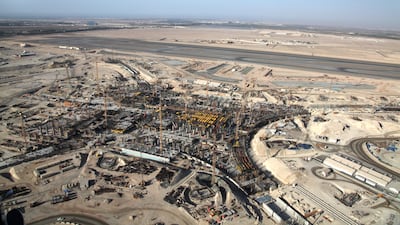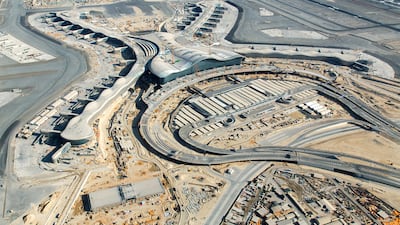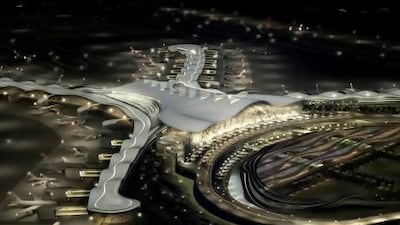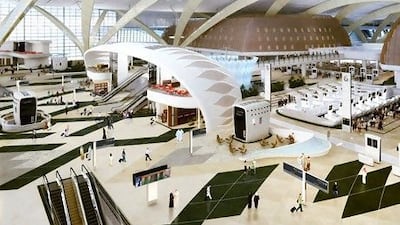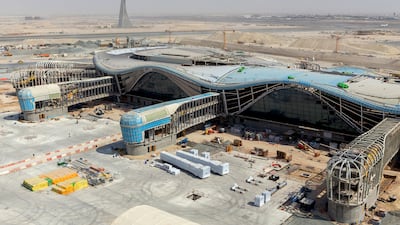Abu Dhabi's non-oil gross domestic product grew by an annual 12.3 per cent to Dh154 billion ($41.96 billion) in the second quarter of this year, the highest since 2014, as the emirate continues to diversify.
The emirate's total GDP for the three months to the end of June also grew by 3.5 per cent on an annual basis, underpinning the “competitiveness and resilience” of its economy, which has helped it to navigate global headwinds, the Statistics Centre Abu Dhabi said on Monday.
Non-oil economic activity has carried Abu Dhabi's momentum forward from the first quarter of this year, when it reached a record Dh146 billion, according to government data.
The value of Abu Dhabi’s total real GDP in the second quarter also hit a record Dh287 billion.
The robust growth of non-oil activities pushed the sector's contribution to GDP to 53.7 per cent, the Statistics Centre said, citing preliminary data.
“The continued strong performance of Abu Dhabi's economy despite mounting challenges in the global economic landscape reaffirms success of the emirate’s diversification strategy and adaptability to market shifts,” said Ahmed Al Zaabi, chairman of Abu Dhabi Department of Economic Development.
“Our comprehensive strategies, prudent policies, countercyclical measures, and business-friendly ecosystem further enhance Abu Dhabi’s position as a rising economic powerhouse and preferred destination for talents, businesses and investments.”
The emirate remains committed to delivering the objectives of “our Falcon economy to reach new heights of sustainable development”, Mr Al Zaabi said.
Abu Dhabi has launched several initiatives to improve the ease of doing business as it aims to attract more investment into the emirate and diversify its economy away from hydrocarbons.
Last year, the emirate launched a new industrial strategy to boost the contribution of the sector to the economy.
It is investing Dh10 billion across six industrial programmes to more than double the size of the emirate’s manufacturing sector to Dh172 billion by 2031.
The hotels and tourism sector, one of the key contributors to the emirate's non-oil economic growth, is expanding at a rapid pace.
The UAE capital is “on track” to meet its target of attracting 24 million visitors this year, up from 18 million last year, the emirate's Department of Culture and Tourism said earlier this year.
The city is also gearing up to open a new airport terminal next month that will increase its capacity, spurring further growth in international visitors and trade flows, according to industry analysts.
Abu Dhabi’s economy grew by 9.3 per cent annually in 2022 to record the highest growth rate in the Mena region last year, with its GDP exceeding Dh1.1 trillion.
The emirate’s non-oil GDP grew by 9.2 per cent in the first half of 2023 on an annual basis, on the back of “successful economic strategies”, including the Abu Dhabi industrial strategy that has positioned the UAE capital as one of the region’s most competitive industrial centres, the Statistics Centre said on Monday.
“The quarterly GDP estimates substantiate this progress and show that the emirate's economy is a competitive advantage for investors,” said Abdulla Alqemzi, acting director general of the Statistics Centre.
The construction, financial services, manufacturing and transport sectors were among the fastest-growing segments of Abu Dhabi’s economy in the second quarter.
Economic activity in the construction sector grew by more than 19 per cent annually in the second quarter to Dh25.3 billion, the highest quarterly value since 2014.
The sector's contribution to Abu Dhabi's GDP stood at 8.8 per cent during the three-month period, according to the data.
The manufacturing sector recorded an annual growth of 7 per cent, also reaching its highest quarterly value since 2014 of Dh25 billion.
It accounted for 8.7 per cent of Abu Dhabi’s total GDP and 16.2 per cent of the emirate’s non-oil GDP during the second quarter.
The financial sector hit its highest growth rate on an annual basis since 2014 – about 30 per cent – during the second quarter as its value crossed Dh18 billion.
The value of wholesale and retail trade activities grew by 13.4 per cent to Dh16.7 billion at the end of June and contributed 5.8 per cent to the total GDP, according to the preliminary data.
The information and communications sector and the public health industry also achieved record growth since 2014, with the value of economic activity climbing to Dh8 billion and Dh4.6 billion, respectively.
The transport and storage sector and the accommodation and food services sector expanded by almost 17 per cent and 13.6 per cent, respectively, during the second quarter.






